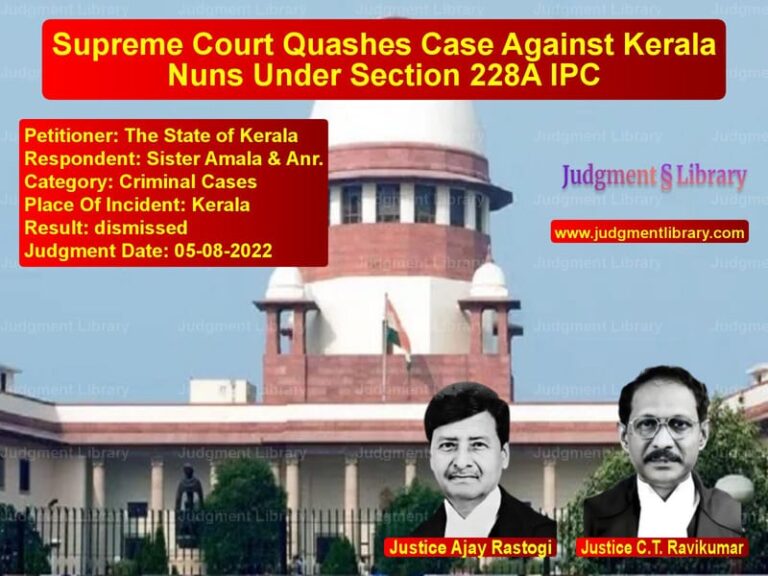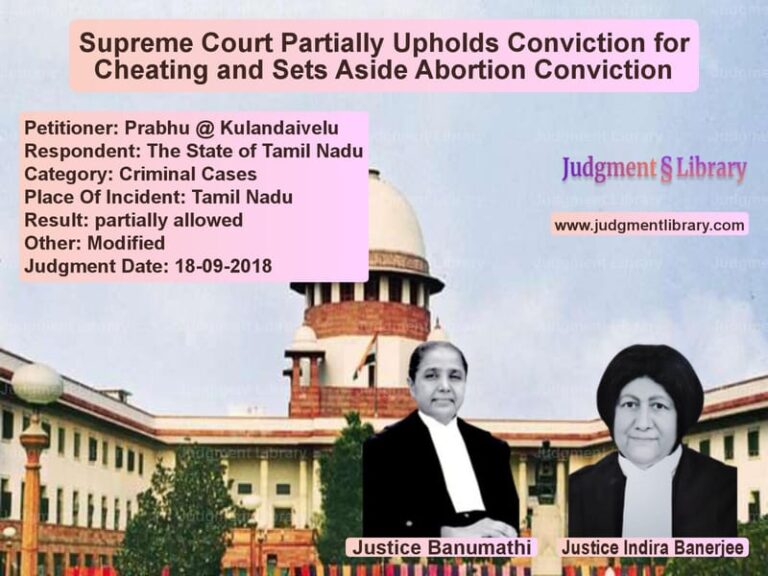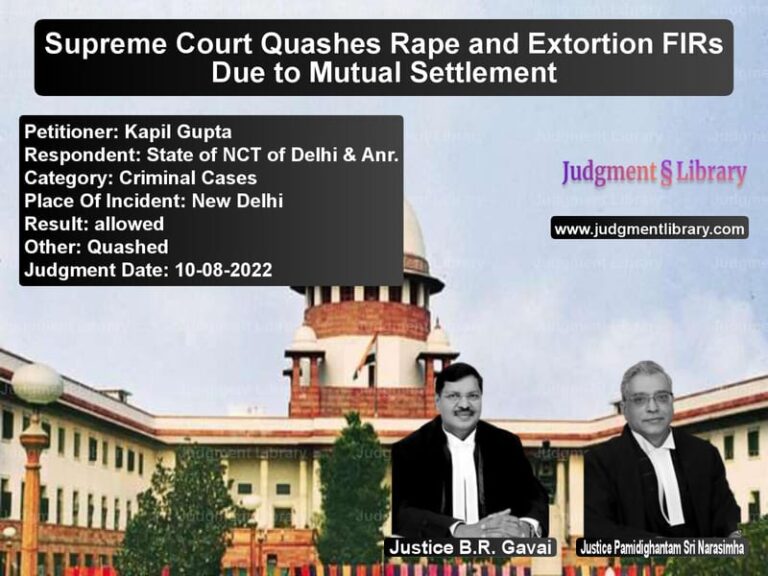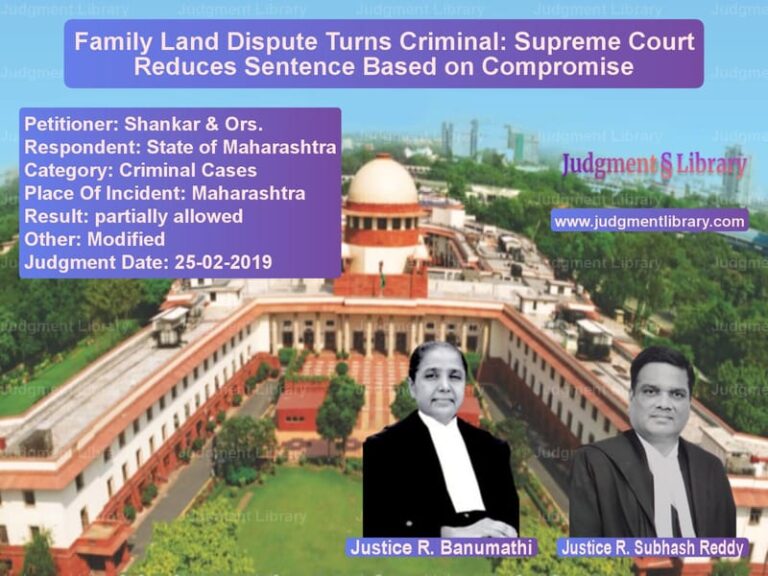Legitimacy and Property Rights of Children from Void Marriages: Supreme Court’s Landmark Ruling
The Supreme Court in Revanasiddappa & Anr. vs. Mallikarjun & Ors. addressed the legal standing of children born from void and voidable marriages under the Hindu Marriage Act, 1955 (HMA) and the Hindu Succession Act, 1956 (HSA). The judgment delves into the interpretation of Section 16 of the HMA and its impact on property rights, particularly in Mitakshara Hindu Joint Families.
Background of the Case
The case involved multiple civil appeals and special leave petitions, raising a fundamental question—whether children born from void or voidable marriages have rights in their parents’ ancestral coparcenary property or are restricted to their parents’ self-acquired property.
Key Legal Issues
The Supreme Court had to determine:
- Whether children from void or voidable marriages could claim a share in their parents’ ancestral and coparcenary property.
- Whether Section 16(3) of the HMA restricts their rights only to the self-acquired property of their parents.
- The implications of the 1976 amendment to Section 16 on children’s property rights.
- The interpretation of the term ‘property of the parents’ under the Hindu Succession Act.
Petitioner’s Arguments
- The petitioners argued that Section 16(1) and 16(2) of the HMA conferred legitimacy upon children born from void and voidable marriages.
- They claimed that once legitimacy is granted, such children should be treated as equal to other legitimate children in terms of property rights.
- They contended that excluding them from coparcenary property violates the constitutional principles of equality.
- They asserted that the term ‘property of parents’ under Section 16(3) should include both self-acquired and ancestral property.
Respondent’s Arguments
- The respondents argued that Section 16(3) specifically limits property rights of such children to their parents’ self-acquired property.
- They contended that granting them rights in ancestral property would disrupt the established principles of Mitakshara coparcenary law.
- The respondents maintained that legislative intent was to protect the rights of legitimate children in coparcenary property while removing the stigma of illegitimacy for children from void marriages.
Supreme Court’s Ruling
The Supreme Court ruled that:
- Children born from void or voidable marriages are legitimate, but their rights in property are limited to the self-acquired property of their parents.
- Such children do not acquire coparcenary rights in ancestral property.
- The phrase ‘property of parents’ in Section 16(3) of the HMA does not include ancestral property that is held jointly in a Hindu Undivided Family.
- However, if ancestral property is partitioned and inherited as a self-acquired share by a parent, children from void marriages can claim a share in it.
Interpretation of Hindu Succession Act
The judgment clarified the impact of the Hindu Succession Act (HSA) on the property rights of children from void marriages:
- Under Section 6 of the HSA, property in a Hindu joint family devolves by survivorship unless it is partitioned.
- Children born from void marriages cannot claim coparcenary rights in a Hindu joint family.
- Upon the death of a parent, their self-acquired and partitioned share devolves to all children, including those born from void marriages.
- Under Section 10 of the HSA, such children are classified as Class I heirs and inherit equally with legitimate children in their parent’s separate property.
Impact of the Judgment
This ruling has significant implications:
- Clarity on property rights: Children from void marriages cannot disrupt Hindu coparcenary structures.
- Equal inheritance in self-acquired property: Such children have equal rights in the self-acquired property of their parents.
- No retroactive effect on Hindu joint family laws: The judgment maintains the structure of the Mitakshara coparcenary system.
Conclusion
The Supreme Court’s ruling in Revanasiddappa & Anr. vs. Mallikarjun & Ors. balances the protection of children’s rights with the integrity of Hindu joint family property laws. While such children are recognized as legitimate, their rights are limited to their parents’ self-acquired property. The ruling upholds the constitutional principles of equality while maintaining the traditional framework of Hindu succession laws.
Petitioner Name: Revanasiddappa & Anr..Respondent Name: Mallikarjun & Ors..Judgment By: Justice Dhananjaya Y Chandrachud, Justice J B Pardiwala, Justice Manoj Misra.Place Of Incident: India.Judgment Date: 01-09-2023.
Don’t miss out on the full details! Download the complete judgment in PDF format below and gain valuable insights instantly!
Download Judgment: revanasiddappa-&-anr-vs-mallikarjun-&-ors.-supreme-court-of-india-judgment-dated-01-09-2023.pdf
Directly Download Judgment: Directly download this Judgment
See all petitions in Property Disputes
See all petitions in Succession and Wills
See all petitions in Landlord-Tenant Disputes
See all petitions in Specific Performance
See all petitions in Damages and Compensation
See all petitions in Judgment by Dhananjaya Y Chandrachud
See all petitions in Judgment by J.B. Pardiwala
See all petitions in Judgment by Manoj Misra
See all petitions in partially allowed
See all petitions in Modified
See all petitions in supreme court of India judgments September 2023
See all petitions in 2023 judgments
See all posts in Civil Cases Category
See all allowed petitions in Civil Cases Category
See all Dismissed petitions in Civil Cases Category
See all partially allowed petitions in Civil Cases Category







